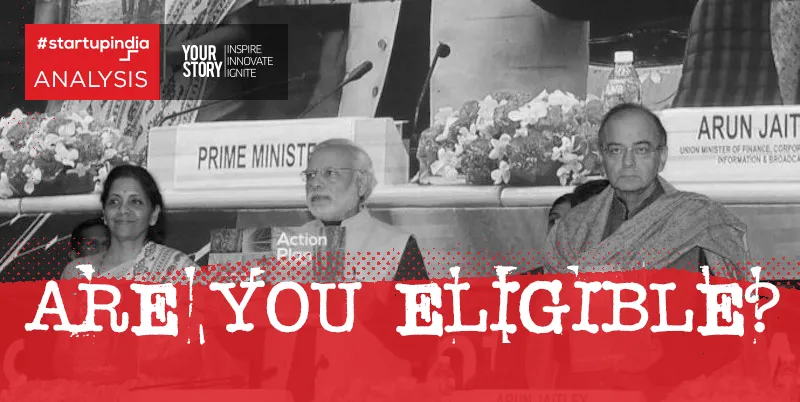Are you eligible for schemes under ambitious Startup Action Plan?

Many entrepreneurs were excited by the announcements made by Prime Minister Narendra Modi as part of the Startup India Action Plan. There’s no doubt the measures were significant, but they do beg the question, are all the startups really eligible for the benefits that were announced?
Here’s a quick analysis of the eligibility criteria(please note that the following flow chart is specifically applicable for startups seeking tax exemption):

In addition, for a startup to be recognized as one,
- It must be an entity registered/incorporated as a:Private Limited Company under the Companies Act, 2013; or
- b. Registered Partnership firm under the Indian Partnership Act, 1932; or
- c. Limited Liability Partnership under the Limited Liability Partnership Act, 2008.
- Five years must not have elapsed from the date of incorporation/registration.
- Annual turnover (as defined in the Companies Act, 2013) in any preceding financial year must not exceed Rs. 25 crore.
- Startup must be working towards innovation, development, deployment or commercialisation of new products, processes or services driven by technology or intellectual property.
- The Startup must aim to develop and commercialise:a) a new product or service or process; or
- b) a significantly improved existing product or service or process that will create or add value for customers or workflow.
- The Startup must not merely be engaged in:developing products or services or processes which do not have potential for commercialisation; or
- b. undifferentiated products or services or processes; or
- c. products or services or processes with no or limited incremental value for customers or workflow
- The Startup must not be formed by splitting up, or reconstruction, of a business already in existence.
- The Startup has obtained certification from the Inter-Ministerial Board, setup by DIPP to validate the innovative nature of the business, and
a. be supported by a recommendation (with regard to innovative nature of business), in a format specified by DIPP, from an incubator established in a post-graduate college in India; or
b. be supported by an incubator which is funded (in relation to the project) from GoI as part of any specified scheme to promote innovation; or
c. be supported by a recommendation (with regard to innovative nature of business), in a format specified by DIPP, from an incubator recognized by GoI; or
d. be funded by an Incubation Fund/Angel Fund/Private Equity Fund/Accelerator/Angel Network duly registered with SEBI* that endorses innovative nature of the business; or
e. be funded by the Government of India as part of any specified scheme to promote innovation; or
f. have a patent granted by the Indian Patent and Trademark Office in areas affiliated with the nature of business being promoted.
* DIPP may publish a ‘negative’ list of funds which are not eligible for this initiative.
Our Analysis
One of the eligibility criteria states that “The product or service should be a new one or a significantly improved version of existing services or products.”
Let’s take the example of startups who are engaged in creating and developing online marketplaces like Flipkart and Amazon. So a new startup engaged in the same field may not be eligible unless its product is significantly improved than what existing players provide.
Another eligibility criteria states that the startup should get a recommendation letter from the recognized incubator cell or be recognized by the GoI or should be funded by recognized funds. Now this will be quite a task for startups.
In our estimate, going by these criteria, roughly 60% of existing startups could be rendered ineligible for the Startup India plan.







